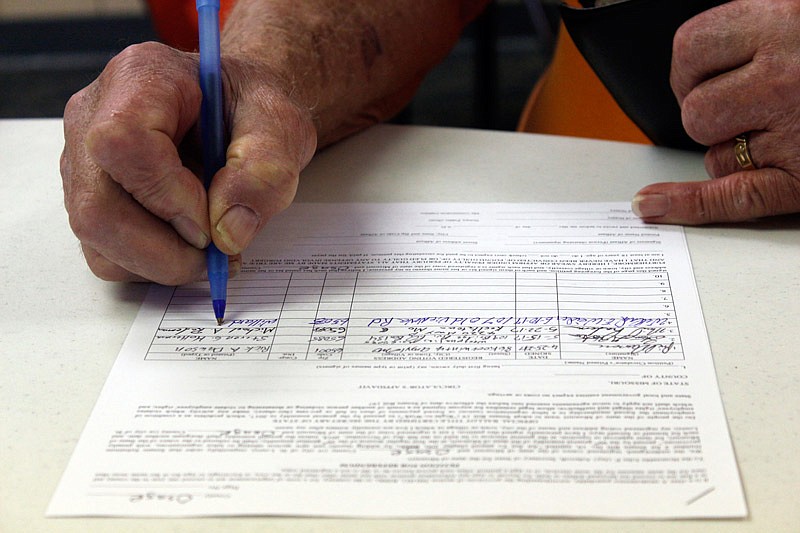A Cole County court ruling Thursday could put a referendum to repeal Missouri's right-to-work law in jeopardy, but local unions vowed to appeal.
A Missouri nurse and two Kansas City police officers filed a lawsuit against Mike Louis, president of the Jefferson City-based Missouri AFL-CIO, in January, arguing the language on petitions to repeal Missouri's then-proposed right-to-work law was "insufficient and unfair."
A Cole County judge agreed Thursday and declared the referendum cannot continue with its current language. Louis vowed Thursday to appeal the ruling.
"Of course, I'm very disappointed in the ruling, but it's nothing unexpected," Louis said. "While it is disappointing, it's just a hurdle we have to get over. We're moving forward."
Months before Gov. Eric Greitens signed Missouri's right-to-work law in February, Louis preemptively filed three petitions with the office of then-Secretary of State Jason Kander. Those petitions proposed amending the state Constitution to ban laws that give local or state government the ability to restrict the financial support between employees and unions. Kander, a Democrat, approved the language before leaving office in January.
The nurse and police officers sued Louis while backed by the Washington-based National Right to Work Foundation. They argued the petition's language was unfair. Starting in April, the case worked its way through Cole County Circuit Court.
Greitens signed the bill, known as Senate Bill 19, in February that allows unions to continue representing workers but provides employees the ability to opt out of paying union dues. With the bill signed into law, Louis submitted a referendum petition in February that would repeal Senate Bill 19 after a statewide vote next November.
Republican Secretary of State Jay Ashcroft approved the referendum's language in late February. The header on the petition above the summary reads "PETITION FOR REFERENDUM."
In his ruling, Cole County Circuit Judge Dan Green found the summary of what the bill would change to be insufficient, saying it did not explicitly state the ballot measure is a referendum.
"The court finds that it is of paramount importance that the summary statement reflect that the ballot measure is a referendum," Green said in his ruling.
Green also cited poor grammar in his decision to halt attempts to move forward with the referendum's current language.
"It is improperly constructed insofar in identifying SB 19's effect, noting what it prohibits, but also stating that it 'make' activity illegal and 'allow' legal remedies," Green said in the ruling.
Louis told the News Tribune this is a small reason to reject a referendum of this importance.
"It shouldn't get hung up on grammatics," Louis said. "And yet it has been."
He also said the AFL-CIO did not write the language that appears on the ballot.
"That was written by the secretary of state, whose job it is to know what is proper," Louis said. "I thought it was proper, and the attorney general thought it was proper."
A referendum petition is a rarely used form of petition that allows voters to enact or reject laws without the General Assembly in the next general election. Missouri residents last voted on a referendum in 1978 when voters decided whether to institute a right-to-work law through the referendum process. In that case, the referendum failed with 60 percent of voters against enacting a statewide right-to-work law.
Laura Swinford, communications director for union advocacy group We Are Missouri and who works on the referendum campaign, told the News Tribune previously that proponents of the referendum simply want Missouri's residents to decide the matter.
"We have have a lot of really energized volunteers who are excited at the idea to be able to have their own say on this bill that would affect so many families," Swinford told the News Tribune previously.
If the petition gets enough signatures to make it on the ballot before the law takes effect Aug. 28, the law will not take effect until Missourians vote on the issue in the Nov. 6 general election.
To get the referendum on the ballot, 5 percent of registered voters who participated in Missouri's 2016 gubernatorial election must sign the referendum petition in at least six of Missouri's eight congressional districts, according to Ashcroft's office.
That's about 90,000 signatures needed before the petition can be placed on the ballot. Green's ruling means the court will not certify signatures collected using referendum petitions with the current language.
Unions statewide held about 50 petition drives June 10 to gather signatures for the referendum. In Jefferson City, supporters gathered signatures at the Central Missouri Carpenters Training Center. Petition drives also took place in Fulton, California, Columbia, West Plains, Centralia and Palmyra.
Louis said Thursday in a statement the Missouri AFL-CIO plans to appeal the ruling. Ashcroft's office said in a statement Friday it's committed to protecting the rights of people gathering signatures but also wants to ensure compliance with the referendum process.
"Although we are disheartened with the court's ruling, we are carefully considering our legal strategy," Ashcroft's office said in the statement.
Louis declined to guess how close the campaign is to having enough signatures to put the referendum on the ballot. He said though he's happy with the progress the campaign is making.
"I'm not sure what percentage we're at; I know we're over 30 percent easily," Louis said. "We fully expect to make the mark to turn in signatures without a problem."
He also said the campaign will start over if it has to, but it will still hit its mark before the Aug. 28 deadline.
"We're going to make it," Louis said. "If we have to do it under new rules or new guidelines, we'll get it done."
Swinford, said Friday that for now the group is pressing on with business as usual. Saturday, she worked St. Louis' PrideFest LGBTQ Festival with a group seeking signatures. She said the campaign prepared for this possibility.
"This isn't anything that we hadn't considered," Swinford said.

